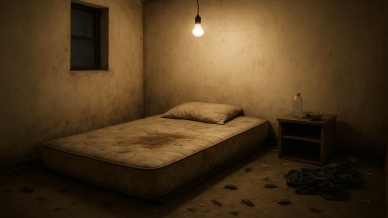Stay updated with the latest - Click here to follow us on Instagram
How UK asylum hotel provider made millions despite allegations of terrible living conditions
Clearsprings currently serves around 30,000 asylum seekers in southern England, London, and Wales. About half of those are housed in hotels subcontracted by the company.

Clearsprings Ready Homes, which holds one of three 10-year Home Office contracts to provide asylum accommodation in the United Kingdom, has pulled in nearly £187 million (INR 2,029 crore) in profits since 2019, even as residents report appalling conditions.
That profit comes amid a dramatic expansion in contract costs: what was once projected at £4.5 billion (~INR 50,000 crore) is now estimated to run to about £15 billion (~INR 165,000 crore.) Clearsprings alone is slated to be paid around £7 billion (~INR 77,000 crore.)
monthly limit of free stories.
with an Express account.
Since 2019, the three contractors collectively have made roughly £383 million (~4,200 crore) in profit.
Clearsprings currently serves around 30,000 asylum seekers in southern England, London, and Wales. About half of those are housed in hotels subcontracted by the company.
But many residents say life in these hotels is intolerable. According to the BBC, some call the food “inedible,” mattresses dirty, toilets broken. One woman says she boils eggs in a kettle to get protein and relies on a food bank because her £9.95/week (~INR 1,100) stipend doesn’t stretch far.
At Hackney Foodbank, staff told the BBC that conditions were “really bad,” noting shortages of toilet rolls, sanitary products, and basic meals.
Since 2020, Clearsprings has paid £183 million (~INR 2000 crore) in dividends to its parent company which nearly matches its profit in that period.
The company has claimed it will repay any profits above contract margins. But so far, the government hasn’t publicly confirmed that any repayments have happened.
Maia Kirby from Good Jobs First told the BBC that Clearsprings “pays as little as possible to suppliers and takes as much as they can in profits.”
Additionally, an open letter from 60 charities paints a picture of asylum seekers kept in “miserable” conditions while “millions in public money … is simply taken in profit by a handful of private companies.”
Its founder, Graham King, is now a billionaire and is the sole shareholder of Clearsprings’ parent company, which has collected most of those dividends.
During a parliamentary hearing, Clearsprings acknowledged hotels can be more profitable than long-term housing and admitted that “living in hotels was ‘really bad for people’.”
MP Paul Kohler called the scale of profit “obscene,” noting the contracts are structured so providers earn far more from hotel use (sometimes eight times more) than from permanent housing.
The company told MPs it would refund profits above 5 per cent margins; in practice it reports average margins of 6.9 per cent.
A notable red flag raised by the committee is a sum of £17 million (~INR 187 crore) paid to an offshore firm, Bespoke Strategy Solutions Ltd in the UAE, which King owns. Clearsprings says the payments were for “strategic services” to its parent firm.
Investigative reports also flagged £16 million (~INR176 crore) worth of payments to that same firm, which may help reduce Clearsprings’ UK tax burden.
According to the Financial Times (FT), in its latest financial year to January, Clearsprings’ pre-tax profit jumped 60 per cent to £119 million (~INR 1300 crore), driven by sustained high demand.
That recent boost has spurred new Home Office scrutiny: ministers are reportedly “shocked” at the profits and are considering renegotiations or even ending some contracts early according to the FT.
Last year, according to the FT, the government began exploring whether to return asylum accommodation oversight to local councils, rather than outsourcing it with officials discussing activating break clauses in contracts from 2026 and trialling locally run systems modelled after the pre-2012 approach.
On oversight, the National Audit Office’s (NAO) 2025 assessment finds that the Home Office has few levers to control costs with hotels alone accounting for about 76 per cent of contract spending, even though they house just ~35 per cent of asylum seekers.
The asylum population in contracted accommodation has more than doubled between December 2019 and December 2024 — from ~47,000 to ~110,000.
The NAO also notes that profit margins declared by suppliers average 7 per cent, which sits at the lower end of the 5–13 per cent range originally built into the contracts.
But data are self-reported, and in 2024 the Home Office commissioned an audit of how profits and performance are declared.
The NAO flagged weak invoice controls with one review suggesting that £58 million (~INR 640 crore) of hotel charges lacked clear documentation.
It also recommended enhancements to contract management, inspection frequency, and safeguarding mechanisms.
The Home Office says it has already triggered audits of suppliers, begun reclaiming excess profits, and is reviewing plans to shift asylum housing away from hotels, potentially back to local authorities or even military sites.